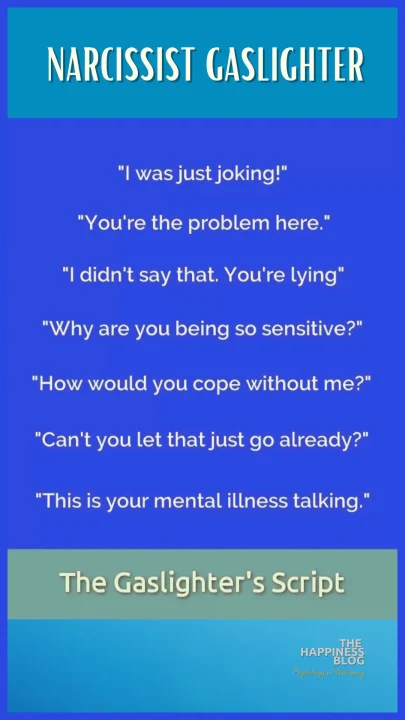Today's Sunday • 12 mins read
— By Dr. Sandip Roy.
Do you always tiptoe around someone in your life, weighing whether your decisions would make them happy or upset? Then you might be a victim of narcissistic gaslighting.
To gaslight is to plant a false reality in the victim’s mind.
Gaslighting is practically true of all types of narcissists. Narcissists may not be equal in other ways, but all of them excel at gaslighting.
Narcissists can gaslight you for years: constantly correcting and reprimanding you, teaching you how to do things properly. Telling you it’s their way of tough love, to make you a better person.
Meanwhile, you keep blaming yourself for not knowing how to think, speak, or act properly.
But that is not the case. They have led you to the final point of self-doubt. What’s worse, the effect is often so deep that you second-guess your choices and actions long after they are gone.
- Gaslighting is manipulating someone psychologically to question their own sanity, particularly by leading them to doubt their own experiences or perceptions of reality.
- Gaslighter: the person doing the gaslighting.
- Gaslightee: the target person.
Read on to find out how a narcissist gaslights and how to deal with them.
Narcissistic Gaslighting
Gaslighting is a form of psychological abuse that involves planting a false reality into a victim’s mind through lying and distorting facts.
Anyone can gaslight, but when narcissists do, it’s narcissistic gaslighting:
- Narcissists gaslight to manipulate their victim into becoming a “helpless sheep” who can’t trust their instincts, and becomes dependent on the narcissist.
- The “sheep” is always confused. They keep doubting whether what they think, feel, recall, and even see with their own eyes is the truth or not.
- Finally, the “sheep” rejects their own perception of reality and starts believing the narcissist’s version of reality.
- A fully gaslighted “sheep” will default to asking the narcissist to confirm what happened in a situation, how to interpret it, and what to remember from it.
- Gaslighting allows the narcissist to have extreme control over their target person, so they keep extracting their narcissistic supply from this victim.
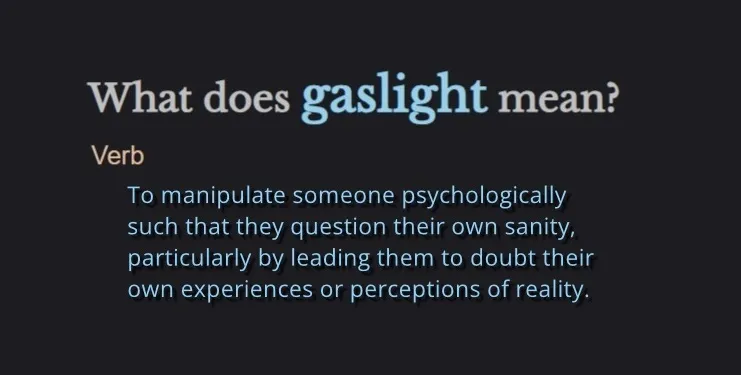
10 Signs of Narcissistic Gaslighting
1. Dismissal of Feelings
They regularly minimize your emotions with lines like “You’re too sensitive,” “You always overreact,” or “You are dramatizing a simple situation,” reframing your distress as irrational.
► Narcissism expert Sam Vaknin would stress it’s part of emotional invalidation meant to suppress your emotional autonomy.
2. Control and Isolation
They control your relationships by dictating who you should keep and who you should let go of. This restricts your social circle, alienating you from your friends and family, people who could validate your perception of reality.
► Narcissism expert Ramani Durvasula would clarify: this isn’t about jealousy, but a calculated attempt to remove mirrors that reflect the abuse.
3. Undermining Self-Worth
They constantly chip away at your self-esteem by insisting others are better, smarter, or more desirable, making you feel somehow defective or inadequate.
► Narcissism expert Linda Hill might note this is gradual and framed as “constructive criticism” to make the control seem helpful.
4. Decision-Making Dominance
They insist on making all decisions in the relationship, big or small, ignoring your choices and preferences. Or, they could allow you to decide when the outcome is set to fail, which they then blame on you for.
► Vaknin would call this “executive control,” a tactic to infantilize and disempower.
5. Questioning Reality
They deny or twist the truth. They rewrite events, deny things you saw, or claim you are hallucinating or misremembering things. To make you doubt your own experiences and second-guess your sanity.
► Durvasula emphasizes that this is the core of gaslighting; they target your grasp on objective truth.
6. Creating Dependency
They train you into learned helplessness, where you know you’re hurting but can’t do anything to relieve it. While you feel powerless and directionless, they position themselves as your sole emotional or practical support. You lose your agency and independence.
► Hill would add, this often starts under the guise of deep care.
7. Blaming and Deflecting
They rewrite narratives to suggest the abuse never occurred, despite clear evidence or witnesses. Worse, they can try to convince you that the offenses they committed were planned by you.
► Durvasula would point to projection and DARVO (Deny, Assault, Reverse Victim and Offender) as key elements here.
8. Trauma Bonding
They cycle between cruelty and affection to get you to trauma bond with them. So much so that making a separation from them feels like abandonment. Ultimately, you either can’t leave them. Or, you keep going back to them after breakups, letting them gaslight you more that it was your fault to leave them.
► Durvasula would highlight this as an addiction loop, rewards coming in unpredictably in between harsh abuse, to keep you attached.
9. Blocking and Insulting
They block you from leaving. They can even explode, insult, or do worse things to stop you from leaving. It may feel like they are too dangerous to understand logic, letting out the full heat of their narcissistic rage.
► Hill would frame this as coercive control, often escalating when they sense loss of control.
10. Accusing You of Over-Sensitivity
They can gaslight you even when you’re crying out in pain. Even when you’re visibly distressed, they can dismiss your pain as an overreaction, branding you as “too emotional.”
► Vaknin would say this is “emotional gaslighting,” a way to rob you of legitimacy in your own narrative.
Classic Traits of Narcissist Gaslighters
A narcissist can gaslight you so subtly that you may not notice it for years. They have these three typical traits:
1. They keep trying to seduce new victims.
After some time with a narcissist, you may see they are constantly trying to entice a new person with their charms.
Narcissists may seem overcritical and harshly judgmental in their old relationships, yet completely adoring and alluring in new ones.
To be honest, they can be quite seductive to those who don’t know them or have never seen a narcissist up close. In fact, their charisma may have drawn you into the relationship.
- Narcissists can start with subtle gaslighting (“Do you realize your friends think you’re an idiot?”).
- They can move to hold total control (“If you want to stay with me, you must cut all ties with them!”).
2. They leave a trail of their bad behavior.
Though they keep it hidden from everyone, narcissist gaslighters often have a track record of deception and dishonesty.
- They often harm those who entrust them with their secrets. They belittle those who are socially weaker than them.
- They have a reputation for taking credit for the good while refusing to accept responsibility for the bad.
- They seek scapegoats for their mistakes and poor performance, especially when their decisions lead to disasters.
- They are envious of other people’s success.
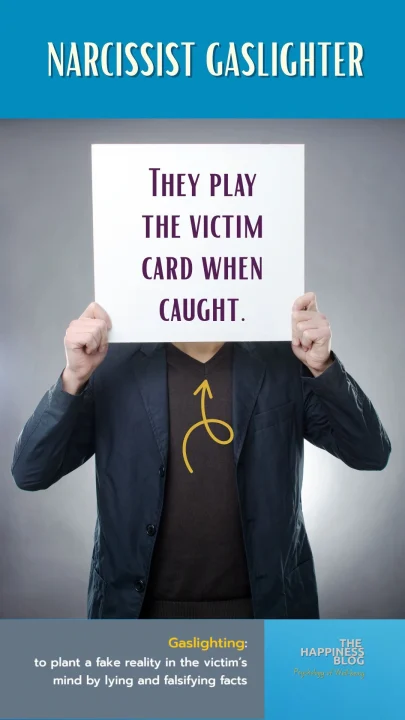
3. They play the victim card when caught.
When caught and confronted, narcissists can play the role of the victim like an expert.
If you ever call them out on their evil motives or bad behavior, they may try to blame you for their acts and make you feel guilty.
It’s common for them to snap back, “You made me do it!”
Narcissistic Gaslighting in Relationships
Narcissistic gaslighting can occur in every relationship.
- In the workplace, a narcissistic coworker or boss may belittle your professional worth, take credit for your achievements, and set unrealistic expectations.
- In friendships, narcissistic people may monopolize your time and isolate you from others. They control your social activities, reacting negatively to your other relationships.
- In family relationships, a narcissist may question your place within the family and label you as the black sheep, leading everyone else to see you as the one to be alienated from family decisions and events.
- In romantic relationships, narcissists do all of the above, plus gaslight you. They push you into doubting yourself. They accuse you of being inauthentic and insincere. Ultimately, they corrode your self-esteem and mental peace
Why do narcissists gaslight?
A narcissist gaslighter’s main goal is to convince you that you are making bad decisions, recalling false memories, and descending into insanity.
Some other reasons are:
- To gain control over the victim’s behaviors, limit their autonomy, and isolate them socially.
- To confuse the victim’s thoughts and beliefs, making them completely dependent on them.
- To willfully hurt someone or weaken their willpower so they self-harm (like making them smoke).
- To keep the victim from leaving the relationship, while lying about the negative outcomes of leaving.
- To avoid taking responsibility for their mistakes and failures, to deny saying or doing certain things, and to distort what you said or did.
- To manipulate others into doing harmful things by persuading them to believe in something false, leading them to commit regrettable actions, and then denying their role.
All to boost their self-esteem and undermine yours.
Is gaslighting in relationships the result of a power imbalance?
How can narcissistic gaslighting harm you?
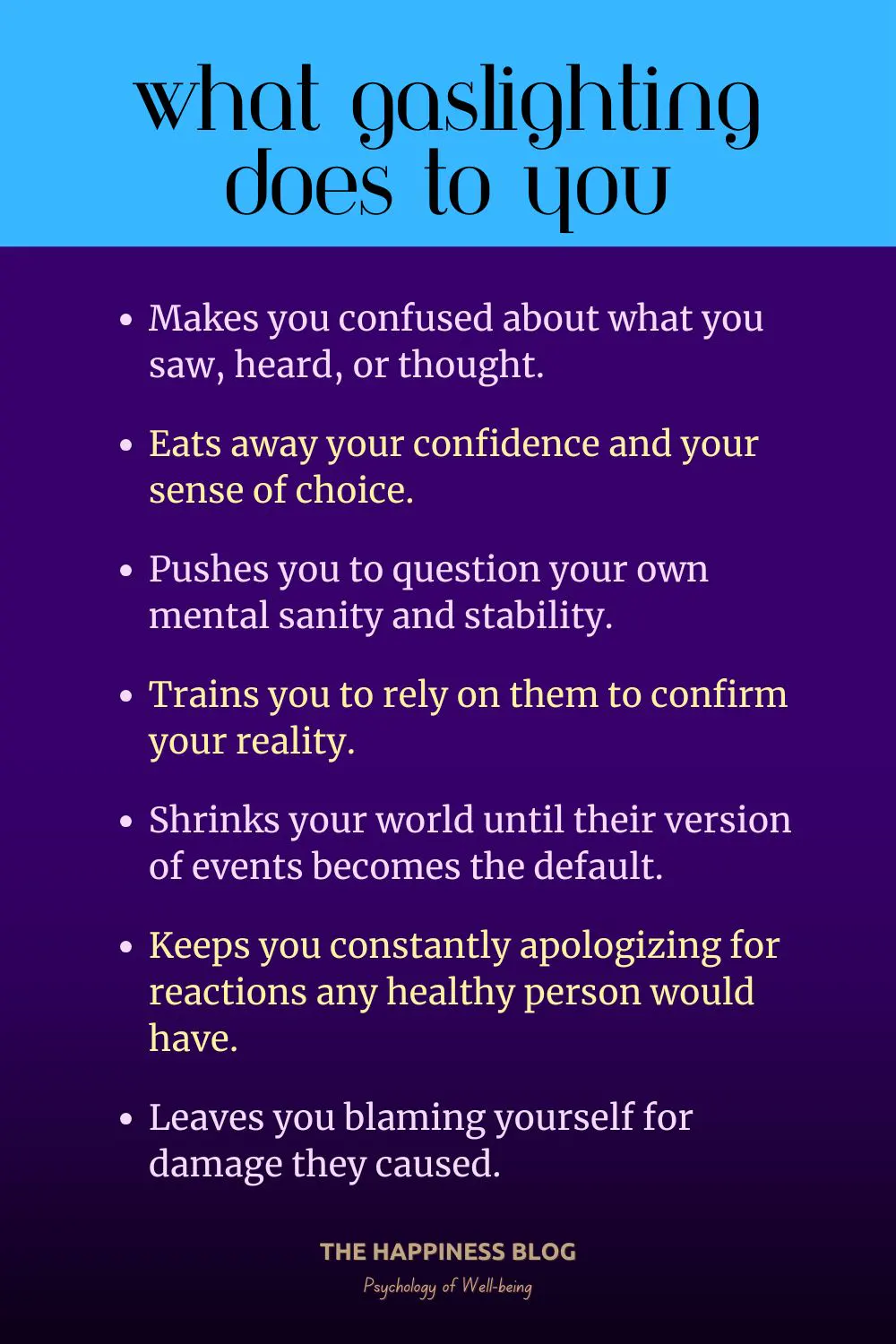
- Narcissistic gaslighting can be a highly traumatic experience. It can destroy your self-confidence, self-esteem, and self-control.
- A narcissist can manipulate you into tremendous mental and physical stress, causing some vulnerable people to break down or inflict self-harm, or, in the worst-case situation, self-harm.
- Repeated cycles of gaslighting and abuse can create emotional numbness in you over time. You may forget how to feel or express happiness, sadness, or distress.
How to deal with narcissist gaslighting and recover?
With a narcissist, you never know where you stand or what to expect next. Somehow, you never feel completely safe or relaxed with them.
They can damage your mental health through gaslighting, making you lose self-confidence and self-perception.
Worse, their abuse might carry scars that can last long after they are not there with you, which can be difficult to recover from.
If you think a narcissist is gaslighting you, here’s what you can do:
1. Recognize the narcissist gaslighter’s script
The first step is to recognize that you are being gaslighted and are, in fact, being abused.
Recognize the signs of gaslighting and take them seriously. Be aware of the classic gaslighting phrases they might use.
A narcissist will often read out from a “pre-written” gaslighting script:
- That’s not what I said.
- That’s not what I meant.
- You always misunderstand me.
- You are lying. You didn’t do that.
- Why are you being so sensitive?
- Can you just let it go and move on?
- I was just joking. Why do you take it seriously?
- Okay, I’m sorry if you say so. What else should I do?
- What do you want me to say about something that never happened?
- Your insanity is getting serious every passing day. We should get you admitted.
All ads for smoking or drinking are gaslighting scripts used by manipulative marketers.
2. Stop blaming yourself.
Narcissists can offer you bliss and then deliver damnation.
- Distance yourself from the narcissist to clear your mind and see things objectively.
- Stop blaming yourself for the abuse, which can be hard if you have been told the abuse was your fault for so long.
- A narcissist can promise never to leave your side and then disappear from your life without any warning.
- Let none of their broken promises make you think that you are to blame for failing the relationship.
Remember that it was never your fault.
3. Keep notes of who said what.
A vital step is to keep notes of what you saw and said, what they said and did, and show them when they try to gaslight you.
4. Share with a trustworthy person.
- Talk to a trusted friend or family member about what’s happening to you.
- Find a support system, whether it’s friends or family members, who will listen without judging you.
5. Seek professional help.
- Get help. Consult a therapist or counselor trained in narcissism.
- Don’t feel ashamed — it is okay to seek mental health care if you suspect relationship abuse.
- Talk to your boss or HR if you’re being gaslighted to at work.
6. Engage in a social activity.
- You deserve to be treated with respect and dignity.
- Begin to work on rebuilding your self-esteem by doing things that make you feel good about yourself, like going out with friends or volunteering at an animal shelter.
- Start making new relationships and going out on dates (even if they are solo dates) again.
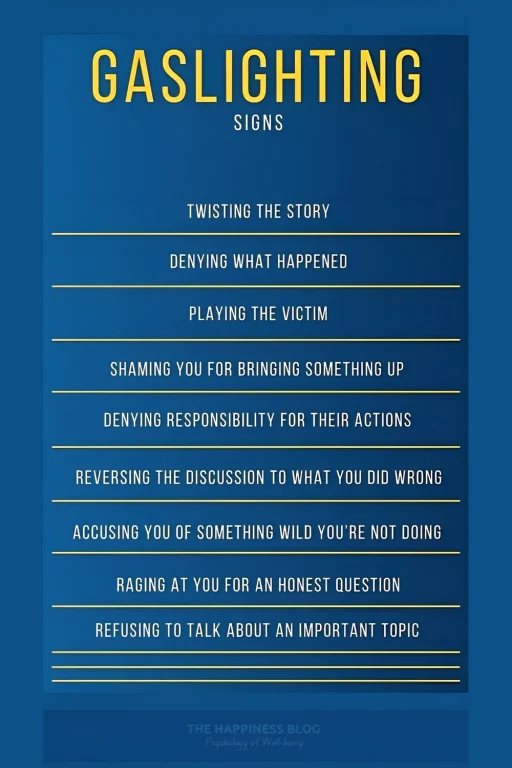
Examples of narcissistic gaslighting
Narcissistic gaslighting shifts your reality in the same way that magician David Copperfield can make massive landmarks like the Statue of Liberty vanish.
While magicians only alter your reality for amusement, gaslighters do so on purpose—to make you go insane.
Example 1
You’ve been dating them for a year when you spot them making up with someone.
You start an argument with them, saying: “I saw you cheating on me!”
They may tell you, “You always suspect that I’d cheat on you. So you saw what you had been imagining. You don’t realize that it’s an outward projection of your inner stories.”
Utterly confused, you may end up telling yourself, “I might have seen it wrong.”
Example 2
A narcissist is slowly finding their way into your heart. You’re almost falling for their claim that you two are soulmates who need each other as much as oxygen.
They often lean close to tell you and sigh, “I wonder what will happen to you without me!”
Then, when you’re dreaming up a wonderful future, they can ghost you or dump you. Leaving you clueless as to what you did to offend them.
Final Words
The term “gaslighting” was coined by Patrick Hamilton for his 1938 play Gaslight, which was later adapted into a film in 1944.
In the movie “Gaslight,” the husband contradicts his wife’s reality and tries to make her doubt herself. She complains that each evening, the gaslights flicker and dim, which he does secretly. But he insists that the gaslights are bright, and she’s hallucinating.
When a narcissist gaslights, they distort your version of reality so much that you may believe something that is the polar opposite version.
A narcissist will gaslight by their very nature; they can’t help it. But you can learn how to leave a narcissist, even when you have no money.
When you disagree with their version, they can lash out at you with such ferocity that you get scared into believing them.
• • •
√ Also Read: 20 Gaslighting Phrases (That Narcissists & Manipulators Use)
√ Please spread the word if you found this helpful.
» You deserve happiness! Choosing therapy could be your best decision.
...
• Disclosure: Buying via our links earns us a small commission.
